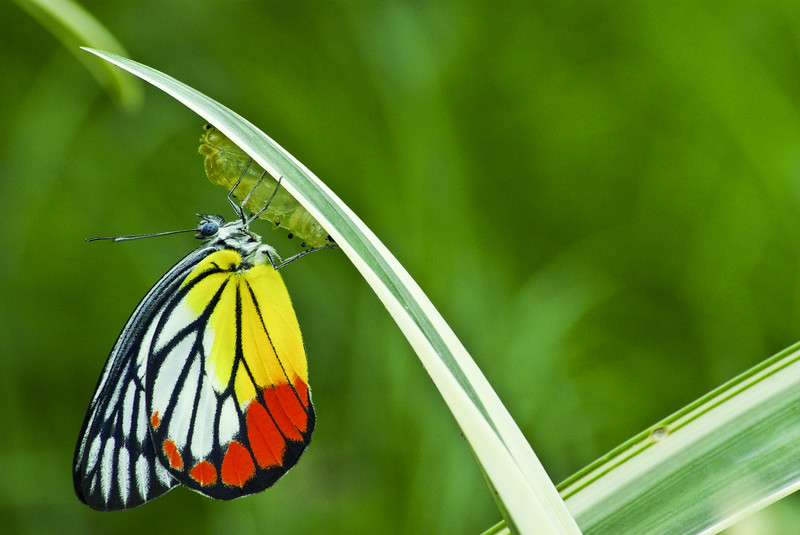Now that educational technology has advanced to the place where it threatens the traditional role of the teacher, I find myself pondering just what our role is as educators. I addressed this question in general in a prior post, but today I would like to discuss what I think is an important role we play: teaching our students worldliness. I use worldliness, here, to connote experience and knowledge of, and connectedness with, the wider world.
I would like to explore the role that we, as educators, can play to pierce the cocoon in which most of our learners have been raised, to let in the sunlight of a bigger world. Until the cocoon is breached, we humans deduce the rules and meaning of existence based upon its confines. When allowed to peer out into the wider world, a new understanding of our place and condition can start to emerge. Inside, on the other hand, we feel safe, because our cocoons are measurable, predictable environments that we have mastered. As we look out into the vast expanse that is the universe outside, we are struck both by wonder at the beauty and fear of the chaos.
Far too many of our learners may never truly emerge. Grand Traverse – the geographical place as well as the socio-economic reality – is safe. It is a known quantity. Our students know the people and the rules of engagement. They can learn to make a comfortable living here, without having an understanding of how this environment is supported by and dependent upon the larger world around it. We have the potential to open our students’ minds about worldly concerns such as the effects of globalization, environmental crises, warfare being used in place of diplomacy, and the political gridlock that has paralyzed our country.
Global commerce has changed the nature and essence of the things found in our cocoons. Locally sourced food stands in contrast to produce grown in one hemisphere during half of the year and in the other hemisphere during the other. Walmart has introduced cheap goods from the four corners of the globe into our homes at prices unimaginable thirty years ago. We must wonder if our clothes were assembled by free labor at living wages or if we are unwittingly participating in a worldwide web of economic slavery. A customer service line connects us with workers who could be anywhere in the world. We are no longer insulated from global commerce by time or distance.
Environmental crises are no longer contained to our cocoons. Rachel Carson was our canary in the coal mine, warning us of massive losses of birds due to persistent DDT levels in our ecosystem. Acid rain and the hole in the ozone layer were other early harbingers of our environmental interconnectedness and vulnerability. As climate change roars into the public consciousness, are we teaching our learners this very recent and analogous history? Our students need to understand that what happens here or what happens on the other side of the globe are not mutually exclusive. We serve a valuable purpose in helping our learners to relate to the people affected by our actions here at home.
Warfare has taken the place of diplomacy in the modern world, in part because of its mechanization – the introduction of cruise missiles and drones. It might be argued that this is for the same reason that people on the road behave differently than people queuing in a line at the supermarket. We do not usually flip off, cuss at, or cut in front of people with whom we must stand face to neck, but put us in a 2000 pound automobile and we are a different animal. Our cocoons keep us isolated at a time when international understanding and cooperation are critical to our survival. We have a role as teachers to bridge those gaps so that, one day, terrorism can be treated as a police problem, and law rather than arms can mediate most state conflicts.
National politics are confounded by the failure of states to look beyond their big and small state prerogatives to find their commonality. Cities have different needs than rural areas, but they are interdependent. Affluent areas have different needs than those with high poverty. Much of our domestic political gridlock can be traced to our failure to understand other perspectives based upon the different environments in which we live, the different cocoons.
With so much emphasis on productivity in America, we have lost touch with the importance of the subjects we teach in higher education that have nothing to do with increasing the number of widgets that can be produced per hour or finding the next killer app that will change our lives forever. Perhaps subjects such as history, geography, ecology, healthcare, ethnic studies, and comparative economics should hold a larger place in our curriculum.
Until that day comes, however, I think that every teacher, whatever their field, can play a part in increasing the worldliness of our students, so that they can become better citizens of this shrinking world. The worldly student is less susceptible to having the wool pulled over her eyes by swift-talking politicians, commercial concerns, and special interest groups. Worldliness is the first line of defense against bigotry, which is caused by ignorance and fear of the unknown. Worldliness is about being unafraid to emerge from our cocoons and flutter about the world, knowing what is out there and what our part in it is.


